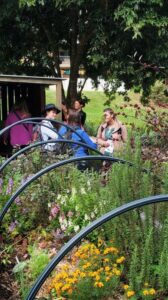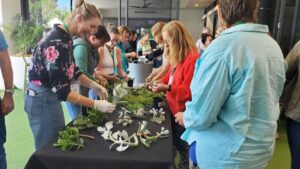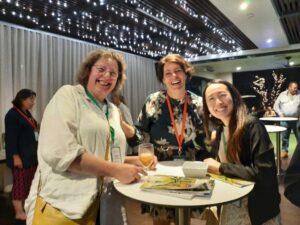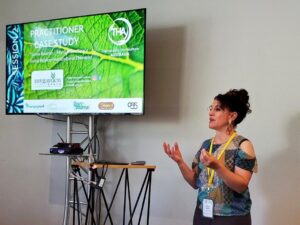Seeds of change
By Leigh McGaghey
Therapeutic Horticulture Australia (THA) recently hosted their national Conference ‘Seeds of Change: Social Physical and Mental Wellbeing Through Therapeutic Horticulture’ at the RACV Resort in Noosa, Queensland. Volunteers delivered a tremendous event over three days, with the conference as well as tours, workshops and social events bringing together delegates from across Australia.

Distance was no obstacle as the conference weas streamed online for those unable to attend in person. More than 20 presentations were delivered from a diverse range of speakers which included TH (therapeutic horticulture) practitioners, researchers, business leaders, landscape architects and designers, and health and community greening organisations. Covering a depth of experience from business start-ups to long-established not-for-profits, there was literally something of interest for everyone. Read on for a snapshot of the conference proceedings.
Flying out from the UK was keynote speaker, Anna Baker-Creswell, founder of the UK’s Veteran’s horticultural therapy establishment, HighGround. Hearing about getting veterans living with physical, social and mental health challenges engaged in the TH programs was both humbling and inspiring, and frequently hilarious. Evidently, Anna was a redoubtable force in taking on the British Ministry of Defence.
Complementing Anna’s segment was Australian veteran Will Gold’s presentation with his ‘Paddock to Plate’ workshop; a gardening and nutrition workshop delivered at a veteran respite rural property, supported by RSL Queensland. As a dietitian and permaculturist, Will designed his program to support veterans living with both mental and physical health challenges relating to their military service, enabling them to grow their own healthy foods whilst nurturing their own wellbeing. This is the aspect of therapeutic horticulture we love – mental health benefits by stealth. We had the honour of visiting the stunning property, as part of the Conference’s full-day tour, in the Queensland Sunshine Coast hinterland where Will’s program is delivered. Together, Anna and Will’s passion and determination to support veterans highlighted the need for more purpose-driven, “non-medicalised” supports for veterans, something that THA is currently engaged in with the Department of Veteran Affairs. Watch this space for more updates on that initiative.

American researcher, occupational therapist, educator and landscape designer, Dr Amy Wagenfeld led a streamed presentation from the US on her life’s work in connecting life-course development with nature experiences, and the profound importance of worthy outdoor space design and programs. Amy’s warmth and easy delivery belied the rigour and extent of her work, and engaged delegates through a synopsis of the nature-connect theories and evidence base, as well as examples of her on-the-ground projects.
Nurturing self through nurturing plants was a consistent theme throughout the conference, underpinning a great diversity of presentations. Peter Dawe and Cliodhna Maguire of Botanic Gardens of Sydney’s Community Greening provided a significant example of this with their presentation on re-connecting First Peoples youth through their culture and gardening project: a joint initiative with the Ngarruwan Ngadju First Peoples Health and Wellbeing Research Centre (AHSRI) at the University of Wollongong, and Community Greening, in an Aboriginal-led research group, to evaluate the Greener on The Outside Youth Community Greening Program.

We heard many similar accounts across the day’s presentations from therapeutic horticulture practitioners working in aged care. Dean Gaston, a Social and Therapeutic Horticulturist at ECH Inc is a provider of care services that enable people to continue to live independently at home as they age. Dean shared the case study of two of his clients, separated by distance and health, but connected through Dean’s innovative use of video and ‘plant swapping and gifting’ between this pair. Compelling support for this came from Dean’s conference co-presenter, Melanie Sanders, Connections Lead at ECH, who described and emphasised the importance of corporate ‘buy in’ and shared a pathway for how work such as Dean’s can be replicated and scaled. The aged care sector sorely needs innovation and success stories such as what was seen in Dean and Melanie’s work. Emotive and impactful, there were quite a few damp eyes in the audience after watching Dean’s video of his elderly clients, connected through their love of plants.

The conference day finished with a panel discussion which considered the future of Therapeutic Horticulture in Australia (big and bright was the consensus), the role of technology in TH, and the importance of relationships to bring the benefits of TH to more people.
In turns, serious, funny, informative and inspiring, the day finished with some great networking and fun at the infamous THA cocktail party.
Leigh McGaghey
President, Therapeutic Horticulture Australia
W. tha.org.au
E: president@tha.org.au
T: 0422 567 434

